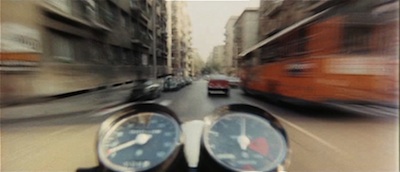 |
| Action across the streets and rooftops of Naples |
Although he is most famous in the United States for 1981's Cannibal Ferox, Lenzi's best work is arguably the giallos and poliziotteschi films he made between 1969 and 79. Violent Naples is an example of the latter, and while it may lack the soul of the films of contemporaries like Fernando Di Leo, it's a pretty exciting piece of work featuring a handful of cracker-jack action set-pieces.
 |
| Violent Naples, starring Maurizio Merli's mustache |
Maurizio Merli plays a cop of the "beat them to a pulp with a car hood first, snarl at them later" school of policing. He swaggers into Naples with a mustache that means business and such a hard-on for crime that the first case that comes his way has him growling that he'll never rest until the savages are behind bars (or in the ground) even as the victims insist they don't want to press charges. He has his "I don't play by the rules if it leaves criminal scum on the streets" speech on such a hair trigger that he launches into it the moment his meek boss suggests that extreme brutality isn't his very favorite style of policing. His macho posturing causes him to report to work with a letter of resignation, just so that if the Chief ever wants to fire him he'll have an easy way to do so. Not sure I understand the logic, but as a state employee myself, I definitely find his ability to get ahead on his paperwork admirable.
Naples, it seems, is under siege by a gang of criminals who specialize in protection rackets and bank robberies, alongside the occasional home invasion or rape (it's nice to have range in any field.) Merli's Inspector has a near-psychic like ability to pin-point all these crimes on a common group of hoods, which is a good thing, as his busy schedule of growling, chasing, and kicking ass leaves little time for detective work.
It's a shame, however, that he can't apply his gifts to protecting the victims of the crimes. When a mechanic's garage is the only shop on the block not to be tousled by a gang of pseudo-thugs (sorry boys, but no matter how many chains you wave around, you don't lose the "pseudo" until you realize that angrily tossing a grocer's lettuce on the ground just isn't that menacing) he immediately zeroes in on the fact that the gang must be saving special retribution for the mechanic, since he encouraged the rest of the block not to pay protection money. When the garage burned down the next day, I'm sure the mechanic's dying thoughts were full of admiration for what a great cop the inspector was for predicting this outcome.
 |
| POV shot from the terrific motorcycle chase sequence |
If the film had to rely for its entertainment value on sophisticated plotting and three-dimensional characters it would be an abject failure. (Vincenzo Mannino's screenplay does show flashes of wit, however. When the inspector arrives for his first day of work at his new department with a hood he collared trying to break into a car, he's greeted by a fellow officer: "So nice of you to come bearing gifts for us on your first day. I hope you didn't pay too much, though, this kind of specimen comes cheap in Naples.") Fortunately, however, this film more than earns its keep in the action department.
Violent Naples belongs to the species of action film, nearing extinction in the United States, seemingly unhampered by onerous insurance requirements or a healthy fear of fatal injury. In one sequence, a motorcyclist tries to cross Naples in under ten minutes for purposes of an alibi, so he drives at breakneck speed through lunch-hour traffic, whizzing between cars and repeatedly crossing perilously into oncoming traffic. Lenzi's camera alternates between wide-angle shots from curbside, shots from a "chase" car, and shots from a camera mounted to the bike. These shots prove that, apart from a brief shot towards the end of the sequence where the film is clearly being run at high speed, there are no tricks here: the stunt is real, the velocity is overwhelming, and so the sequence is absolutely thrilling.
 |
| A single take which moves from this shot... |
 |
| ...to this shot leaves no doubt who's clinging to the train. |
Likewise, when Merli finds himself atop a moving train, the camera consistently finds ways to frame his face, the train, the tracks and the moving cityscape so that we know it's really him running across the top of the train, or clinging to its roof as it makes its way up a steep graded hill. This kind of veracity to the stunts ensures that audiences are drawn in and that action junkies will be absolutely thrilled.
Nor is the action the only thing to recommend the title. Franco Micalizzi's score is pretty terrific, the always appreciated John Saxon (A Nightmare on Elm Street, The Girl Who Knew Too Much) shows up as a shady financier, and Sebastiano Celeste's cinematography does a great job depicting Naples as a city starting to rot from unchecked crime. Lenzi's crime films may never compare to Di Leo's (to say nothing of his contemporaries in France and Japan like Melville and Fukasaku), but Violent Naples is still a well crafted action film that is more than capable of making up for what it lacks in sophistication with adrenaline.

No comments:
Post a Comment